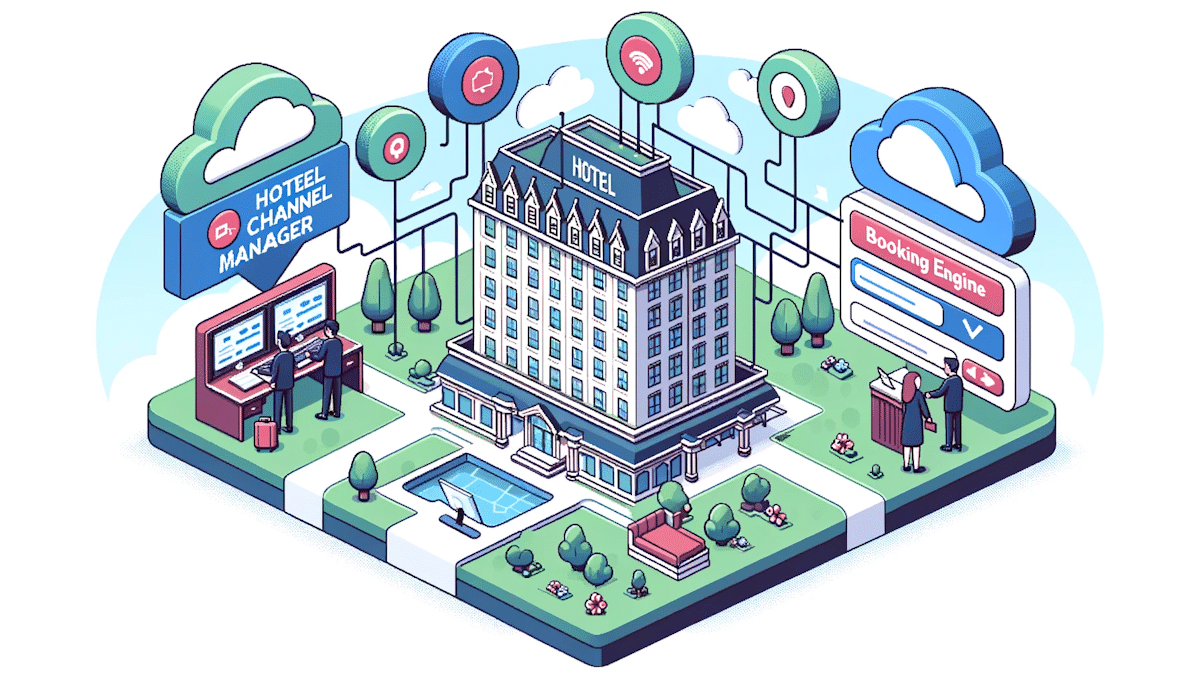Table of Contents
Understanding the Difference Between a Channel Manager and a Hotel Booking Engine
Introduction
In the dynamic world of hospitality, technology plays a significant role in streamlining operations and enhancing customer experiences. Two such technological tools that have revolutionized hotel management are the hotel channel manager and the booking engine. However, there is often confusion about their roles and functionalities. This blog aims to demystify these two critical tools, highlighting their differences, benefits, and how they can be leveraged for optimal hotel management.
Understanding a Hotel Channel Manager
A hotel channel manager is an essential tool for any hotelier looking to increase their online visibility and revenue. It is a software solution that allows hotels to manage room distribution across various online travel agencies (OTAs), global distribution systems (GDS), direct booking platforms, and other digital channels from one central platform.
The primary function of a hotel channel manager is to ensure real-time synchronization of inventory and rates across all connected channels. This means that whenever a booking is made or cancelled on any platform, the inventory gets updated instantly across all other channels. This helps in avoiding overbooking or underbooking situations.
Moreover, it allows hoteliers to control pricing strategies dynamically, based on demand and supply conditions. By providing insights into market trends, competitor pricing strategies, and consumer behavior patterns, it assists in making informed decisions about room pricing.
The Benefits of Using a Hotel Channel Manager
A well-integrated hotel channel manager offers numerous benefits:
1. Enhanced Online Visibility
By distributing your inventory across multiple OTAs and GDSs worldwide, it increases your property’s visibility leading to higher bookings.
2. Real-Time Inventory Management
It ensures real-time synchronization of your inventory across all channels preventing overbookings.
3. Dynamic Pricing
It allows you to adjust room rates dynamically based on market conditions maximizing revenue.
4. Time-Saving
It eliminates the need for manual updates saving valuable time and eliminates data entry errors.
Understanding a Hotel Booking Engine
A booking engine, on the other hand, is a software application integrated into a hotel’s website and social media pages, allowing guests to book rooms directly. It provides a secure and user-friendly platform for guests to check room availability, prices, and make reservations.
Unlike a hotel channel manager that manages multiple distribution channels, a hotel booking engine focuses on direct bookings. It enables hotels to bypass intermediaries like OTAs, thereby saving on commission costs.
The Benefits of Using a Hotel Booking Engine
A robust booking engine offers several advantages:
1. Increased Direct Bookings
By providing an easy-to-use booking platform on your website or social media pages, it encourages guests to book directly.
2. Reduced Commission Costs
Direct bookings mean you don’t have to pay commissions to OTAs.
3. Enhanced Customer Engagement
It allows you to engage with your customers directly, offering personalized services and deals.
4. Secure Transactions
It ensures secure online transactions protecting both the hotel and the guests.
The Interplay Between the Hotel Channel Manager and Hotel Booking Engine
While both tools serve different purposes, they complement each other in achieving the ultimate goal – maximizing hotel revenue while enhancing guest satisfaction.
The hotel channel manager broadens your reach by distributing inventory across multiple online channels while the booking engine drives direct bookings by providing an easy-to-use reservation platform on your website or social media pages.
Moreover, when integrated with each other, they provide real-time synchronization between direct bookings from your website (via the booking engine) and those from OTAs (via the channel manager). This ensures consistent availability information across all platforms preventing overbooking situations.
Conclusion
In conclusion, both the channel manager and hotel booking engine are indispensable tools in today’s digital age of hospitality management. While they serve different functions – one managing multiple distribution channels and the other driving direct bookings – they work together in harmony to optimize room distribution, maximize revenue, and enhance guest experiences. Understanding their differences and benefits is key to leveraging them effectively for your hotel’s success.

